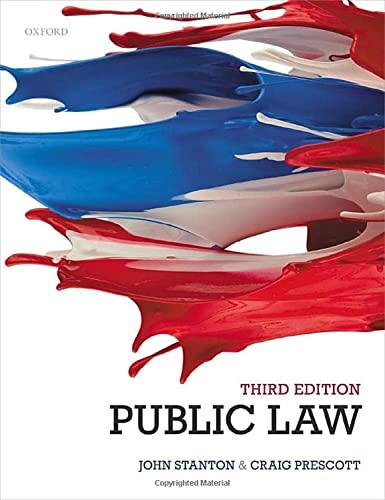Question
Deann Turcott believed that she was going to inherit half of her father's, Clarence Bates's, estate. Clarence had executed a will in 1996 leaving his
Deann Turcott believed that she was going to inherit half of her father's, Clarence Bates's, estate. Clarence had executed a will in 1996 leaving his real property to his two children, Deann and Clint, to "share and share alike." During Clarence's life, Deann Turcott and her husband moved onto his property. From 2007 to 2014 they spent a significant amount of time and funds maintaining and improving Clarence's land including: "cultivating fields that had become overgrown with weeds; raising hay crops; raising cattle; maintaining fencing; clearing brush; restoring a barn; maintaining and repairing farm equipment, and performing administrative work associated with the farm and timberlands. Deann also built a personal residence on the property in 2012." Clarence did not request that Deann make these improvements, but he was aware that Deann was making them. (There is one exception, but it is not an issue here.)
Deann acknowledges that she did the work because she expected to inherit half the estate. Clarence remarried in 2014, and in 2015 he executed a new will that revoked all his prior wills. He put all his assets into a trust for himself and Janet, his new wife. The will specifically said that Deann would not inherit under it.
For this discussion, you'll need to read the case first and do the research prior to answering the questions below for this case study.
QUESTIONS FOR THIS CASE:
- What is unjust enrichment?
- Did Clarence Turcott receive an unjust enrichment from his daughter Deann because of her work done on the estate? How specifically?
- In his new will Clarence declared "I purposefully have excluded my daughter, Deann Turcott as a devisee of my estate, and my daughter, Deann C. Turcott shall take nothing from my estate." Do you believe that Clarence was trying to avoid paying his daughter for all the work she had done on the property?
- Deann wants to recover from the work she and her husband did. Should Deann recover based on implied-in-fact contract, quasi-contract, or some other theory? Why or why not?
- After reading the case, what was the final decision of the courts in resolving this dispute?
- Do you believe that Deann received a fair and equitable remedy in this case?
- After reading the case, do you believe that Deann should have waited and not done anything to the estate until after her father's death? Why or why not?
- In conclusion, you need a paragraph as to what you've learned overall from this case.
RESEARCH:
Turcott v. Estate of Bates, 165 Idaho 183, 443 P.3d 197 (2019).]
https://law.justia.com/cases/idaho/supreme-court-civil/2019/45920-2018.html
https://www.leagle.com/decision/inidco20190607210
https://scccd.instructure.com$CANVAS_COURSE_REFERENCE$/
Unjust-Enrichment
https://legaldictionary.net/unjust-enrichment/
Quantum Meruit
https://legal-dictionary.thefreedictionary.com/quantum+meruit
Implied-in-Fact Contract Law and Legal Definition
https://definitions.uslegal.com/i/implied-in-fact-contract/
Quasi Contract
https://legal-dictionary.thefreedictionary.com/Quasi+Contract
Step by Step Solution
There are 3 Steps involved in it
Step: 1

Get Instant Access to Expert-Tailored Solutions
See step-by-step solutions with expert insights and AI powered tools for academic success
Step: 2

Step: 3

Ace Your Homework with AI
Get the answers you need in no time with our AI-driven, step-by-step assistance
Get Started


